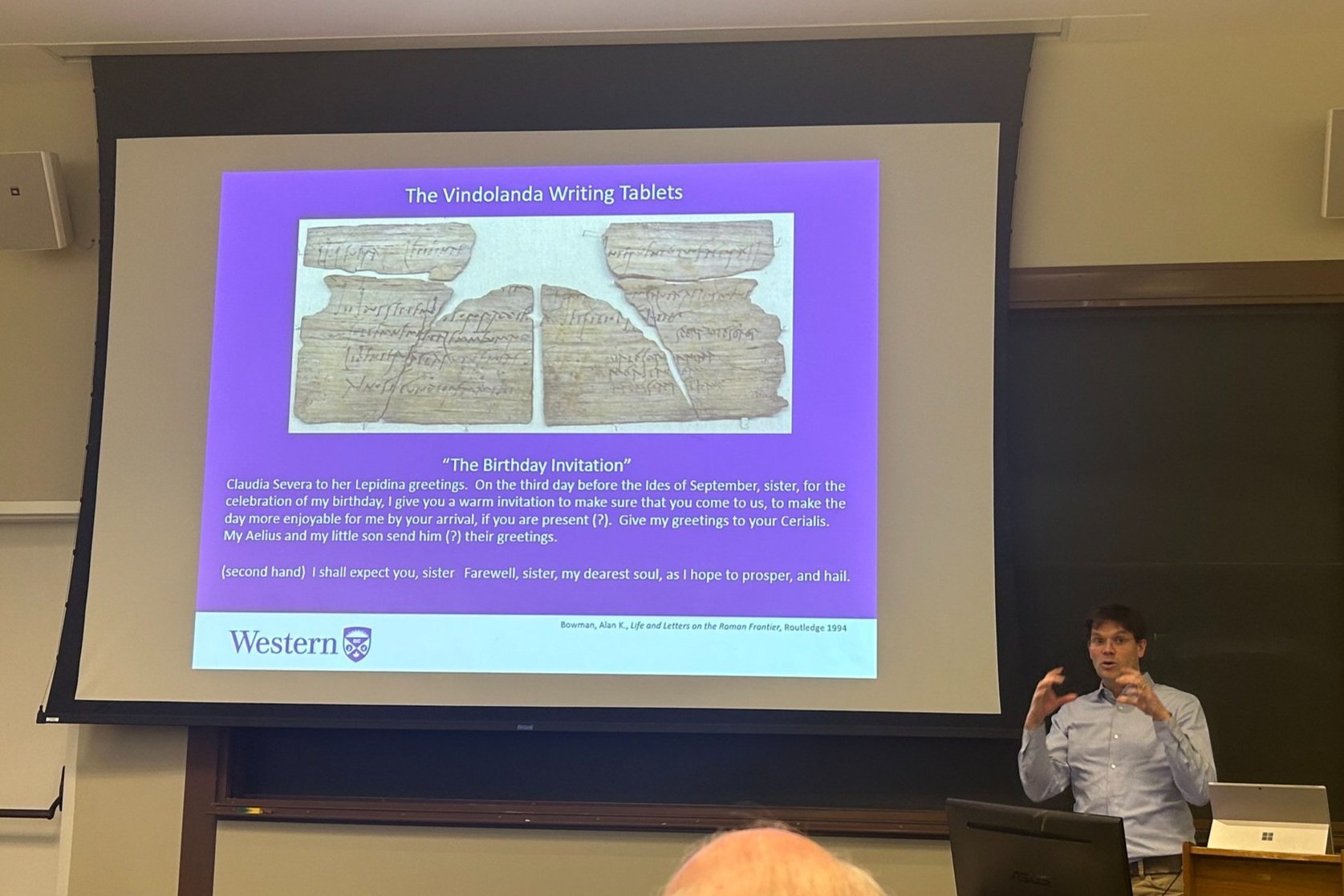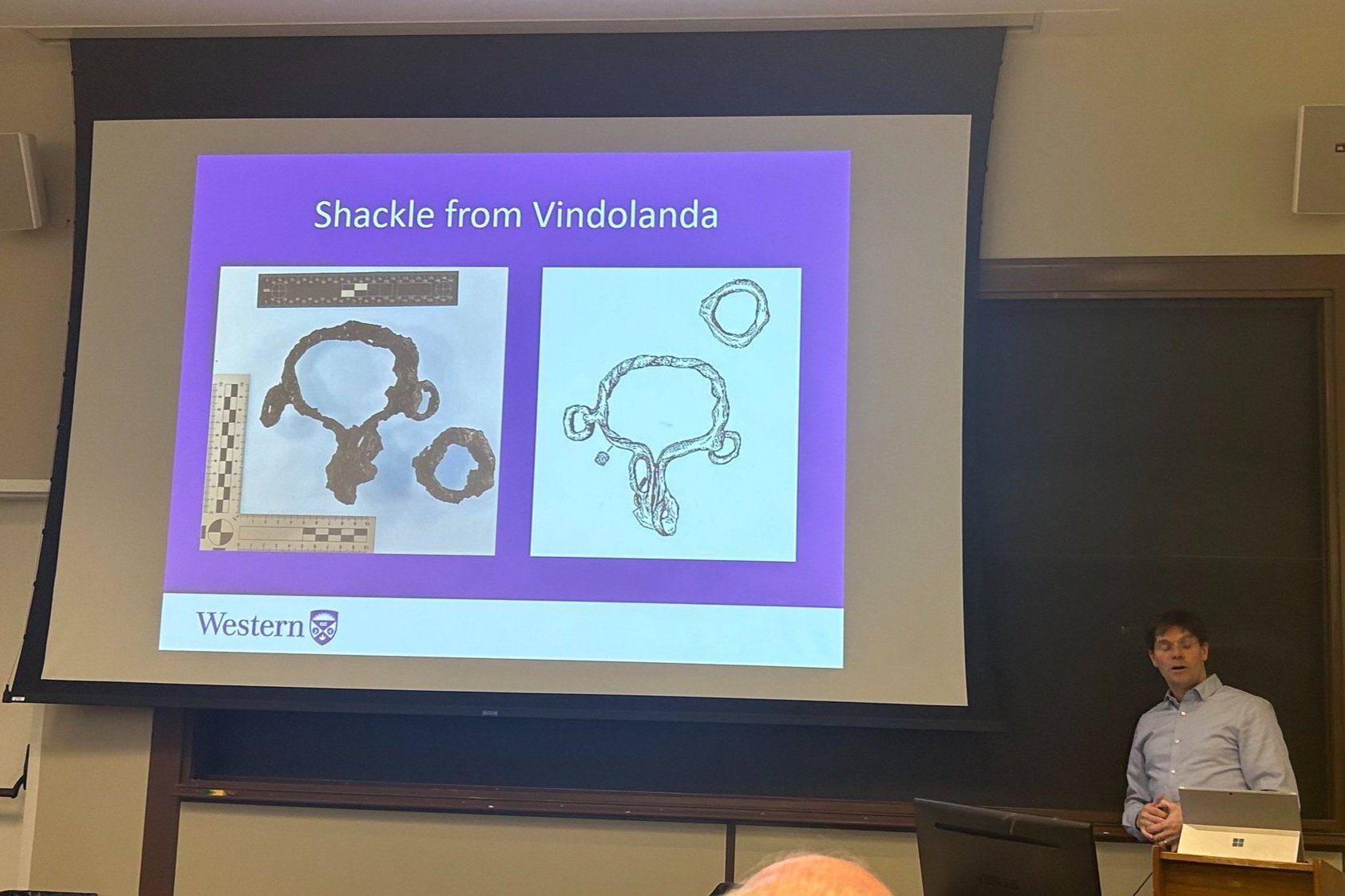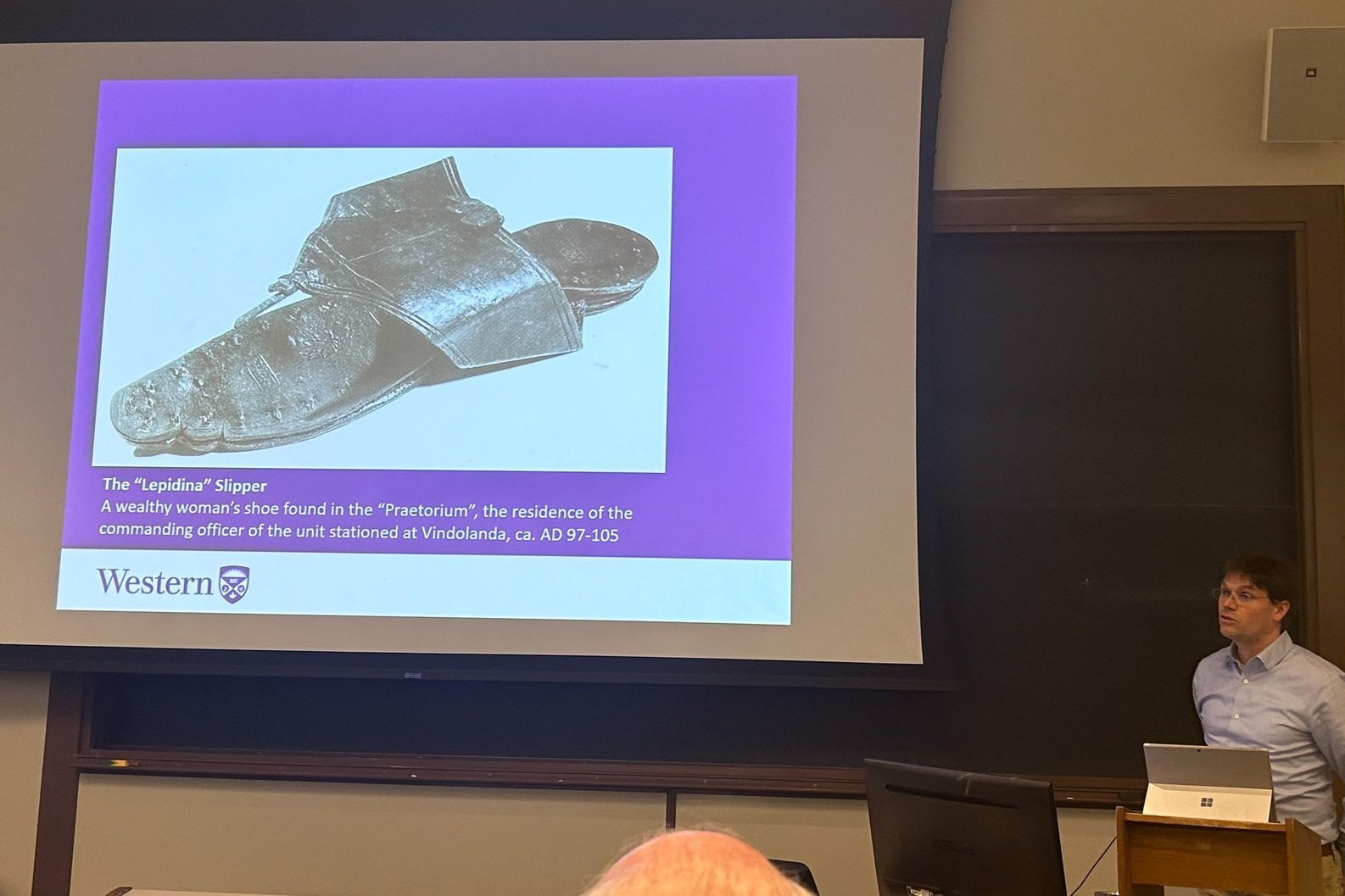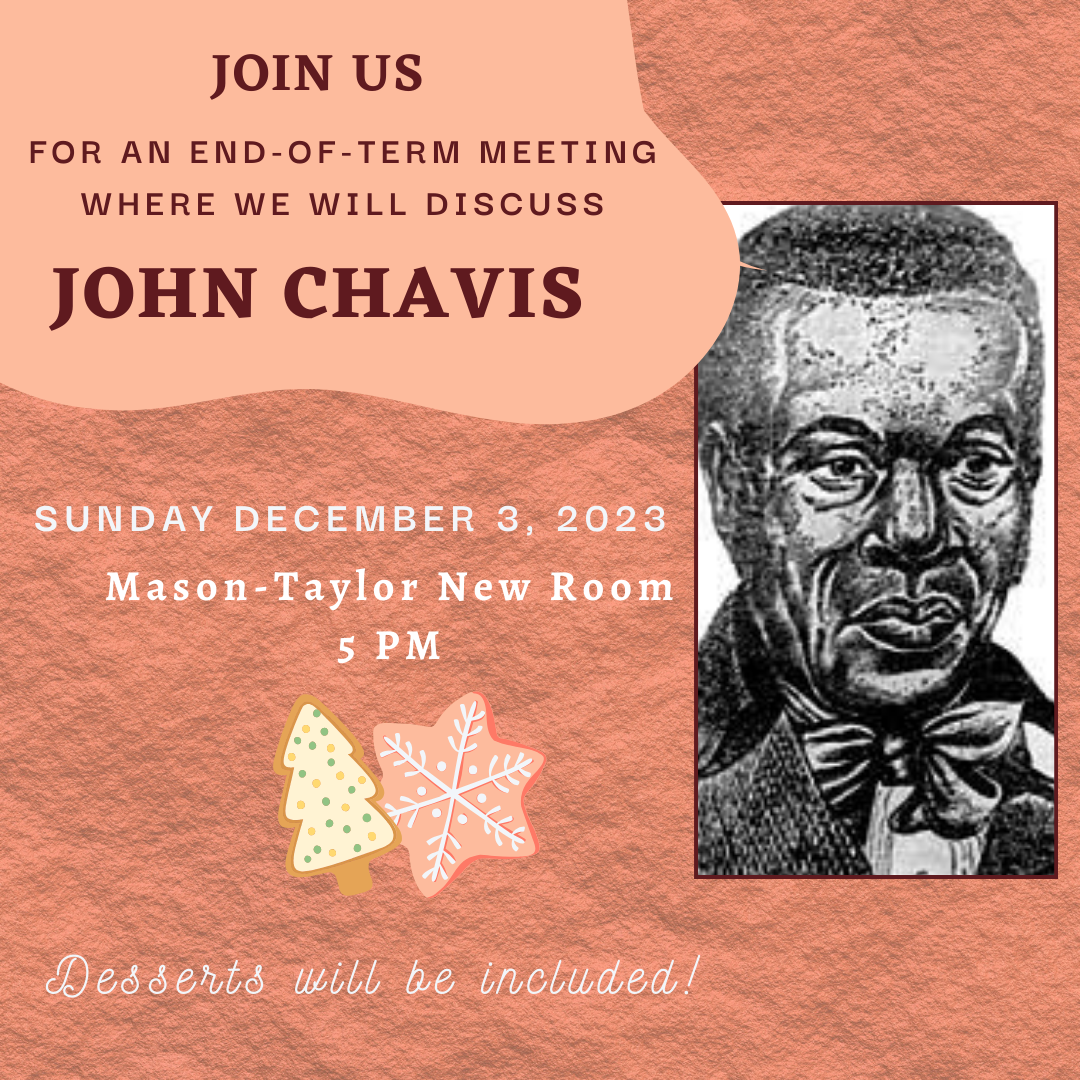End-of-Term December News Recap
In the News: End-of-Term Recap
[Exhibit in Watsoon Galleries (left), students assemble at VMI debate (top), Vindolanda archeaological site (bottom)]
(11/28): VMI in collaboration with Braver Angels hosted an intercollegiate debate on book-banning. CLICK HERE for a summary of the debate.
(11/28): Classics enthusiasts filled a classroom on Tuesday, November 29 to hear Alexander Meyer, an associate professor of classics at the University of Western Ontario, speak on “Enslaved People on the Roman Frontier: Evidence from Vindolanda Roman Fort.”
Meyer has been the co-director of the Vindolanda Field School since 2012, and his talk focused on this same Roman fort along Hadrian’s wall, a UNESCO World Heritage Site.
Seven different forts from various eras were built on top of each other, and sit atop the Vindolanda site today. Because of natural conditions, Vindolandan artifacts have been preserved in an anoxic (oxygen-free) state beneath the British soil since the first fort was erected in the late-1st century AD.
Site archaeologists — most of whom are volunteers — have found coins, water pipes, wooden boxes, human remains, swords, helmet crests, and more. In total, over 4,600 leather shoes and boots, and over 1,300 ink tablets have been excavated.
These ink tablets have given historians a window into everyday Roman life. One tablet contains an invitation to a birthday party that looks surprisingly similar to ones today. Meyer has also found many wooden tablets, which he is learning to read using various computer imaging techniques. One such tablet was likely a bill of sale for a Roman slave.
Meyer concluded his presentation by proposing that one building found on site — although officially identified as a water cistern — was actually (or at one point) a subterranean dwelling built for slaves.




(11/30): The Museums at W&L welcomed printmaker and painter Mohammad Omer Khalil to campus on Thursday, November 30 to discuss his exhibit titled “Musings,” which opened in Watson Galleries in September. After a question-and-answer segment, the artist led a stroll through the gallery. The exhibit was curated in part by the spring term course, Seminar in Museum Studies.
Two students from the course interviewed Khalil, inquiring about his creative process and his relationship to different areas of the world–especially Morocco. During the audience section of the Q&A, Khalil stated that he identifies simply as an artist, choosing to focus on his art rather than his race or ethnicity. The event was free and open to all, and approximately 60 people attended.
(Homage to Basquiat 2 (2022), by Mohammad Omer Khalil. On exhibit in Watson Galleries.)
(12/1): Nate Tsang, a software engineer and research scientist with Riot Games, spoke in Northen Auditorium on Friday, December 1 about the work that his group does with Artificial Intelligence (AI) and how that technology affects the development of games. His talk began with a brief explanation of the history of machine learning and how AI development has rapidly increased in recent years. He mentioned a few types of machine learning and how his company uses bots to test games for bugs and balance mechanics. Finally, Tsang speculated on the potential uses of AI in future game development and how it might help in esports.
(12/3): Students for Historical Preservation (SHP) hosted an end-of-term meeting in the Mason Taylor New Room on Sunday, December 3, where they discussed the life of John Chavis, the first ordained Black Presbyterian minister in America.
Reading an excerpt from Helen Othow Chavis’ 2001 biography, participants discussed his Revolutionary war service, his complicated educational journey at both Princeton and the then-Liberty Hall Academy, and his nineteenth-century ministerial career in Virginia and North Carolina. They concluded the meeting by discussing the worsening racial tensions in the 1830s that made it illegal for Chavis, a free Black, to preach.
SHP leaders also unveiled their winter term schedule, which includes monthly discussions on important people and periods in W&L history, as well as day trips to Mt. Vernon, Monticello, and New Market Battlefield. All campus events are open to the public.
(Flyer from the John Chavis event, featuring an inspired sketch of Chavis. Source: SHP)
(12/5): Following months of debate surrounding the removal of two “sexually explicit” books from Lylburn Downing Middle School, the Lexington School Board adopted a finalized book review policy on Tuesday, December 5. The review policy, which will be immediately applied to Kiss Number 8 and It’s Perfectly Normal, begins when a resident of the city of Lexington, a parent with a child enrolled in the school, or an employee in the school, submits a complaint against either library or instructional (classroom) material.
A review committee forms if either the librarian or teacher (for instructional material) disagrees with the decision. December’s policy removed the principal from that initial determination. The complainant can appeal to the superintendent and then the school board, and the decision made at the highest level will remain in effect for four years. During the review process, challenged materials will remain in circulation.
Now that the school board has approved a policy, they have authorized school librarians to resume adding new material to the collection. The updated LCS Policy Manual may be viewed HERE
(12/6): Hosting their semesterly "Weigh the Waste" event, volunteers from Campus Kitchen, the Student Environmental Action League (SEAL), and Dining Services asked students to guess how much food waste the dining hall would accumulate at dinner on Wednesday, December 6. Two students won gift cards for guessing closest to the 132 lbs. of waste ultimately collected.
Reflecting on the activity, event organizers reminded students that reducing food waste both lessens the strain on the compost crew and "lets Campus Kitchen repurpose more leftover food into balanced meals to feed people experiencing food insecurity in the local Rockbridge area."
(Gibson Ward, ‘27, volunteers to collect food waste in the dining hall. December 6, 2023. Source: Katie Yurechko)
(12/7): W&L’s University Singers performed its traditional Lessons and Carols service on December 7, after a three year break. The service was held in Lee Chapel, National Historic Landmark, and was adapted from the “Festival of Nine Lessons and Carols” performed at King’s College, Cambridge since 1918. Featured music blended traditional and new songs and included F. Melius Christiansen's Wake, Awake and Jocelyn Hagen's Mother's Song.
The festival had been canceled each of the past three years due to the COVID-19 pandemic and conflicting University Singers events — last December, University Singers participated in the City of Derry International Choir Festival and could not perform the on campus event.
According to Shane Lynch, W&L’s Director of Choral Activities, the Lee Chapel Lessons and Carols service dates to before 1954, when W&L’s first music professorship was established.
In an email to The Spectator, Lynch explained how he finds that “the combination of read text and music is extraordinarily powerful. The texts inspire the compositions, and the compositions then comment on the texts.”
The University Singers are W&L’s main choral group and perform nationally and internationally, winning recognition from the American Choral Directors Association, the Virginia Music Educators Association, and the City of Derry International Choir Festival, among others. They frequently perform at university events.
A livestreamed recording of the Lessons and Carols service can be found HERE.
(University Singers perform “Lessons and Carols” in Lee Chapel. December 7, 2023. Source: Vimeo)
[Caden Brousseau, Alexa De La Cruz Cisneros, and Nathan Gilbert also contributed to this article.]






